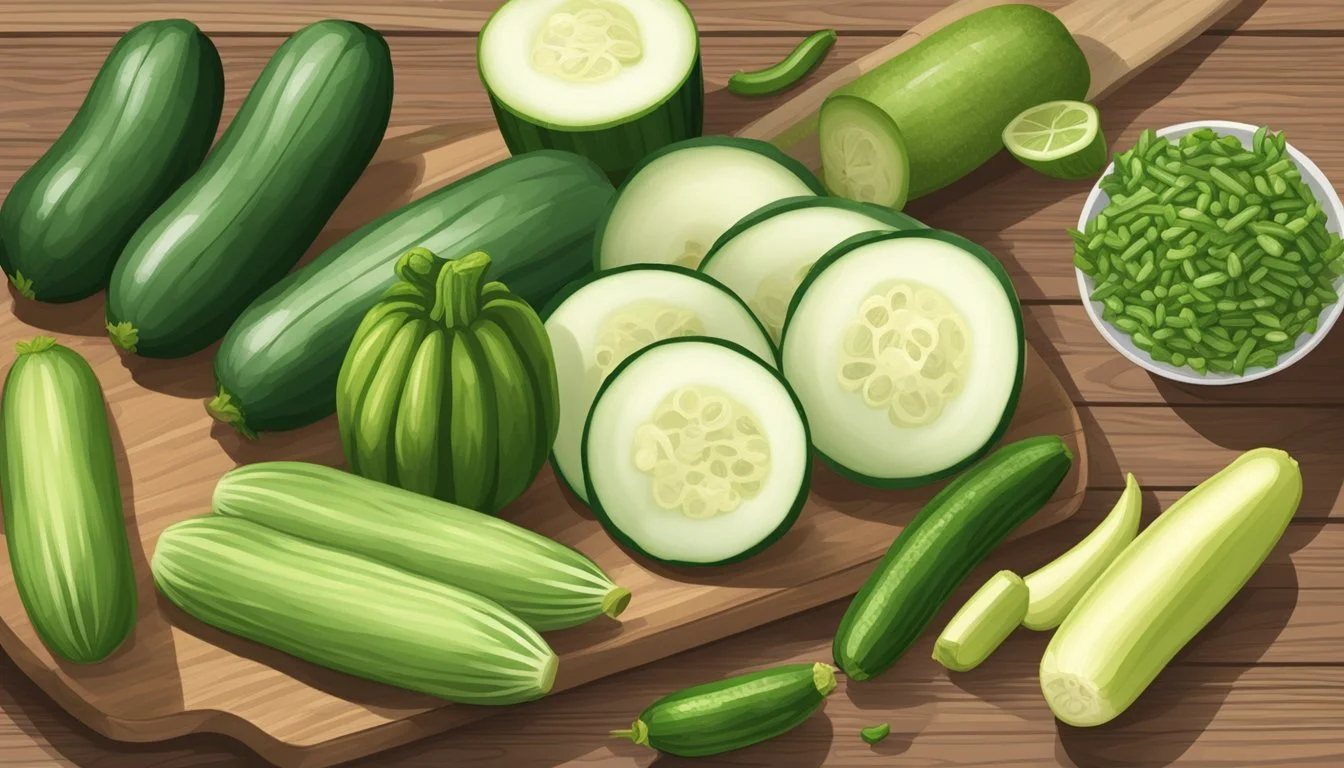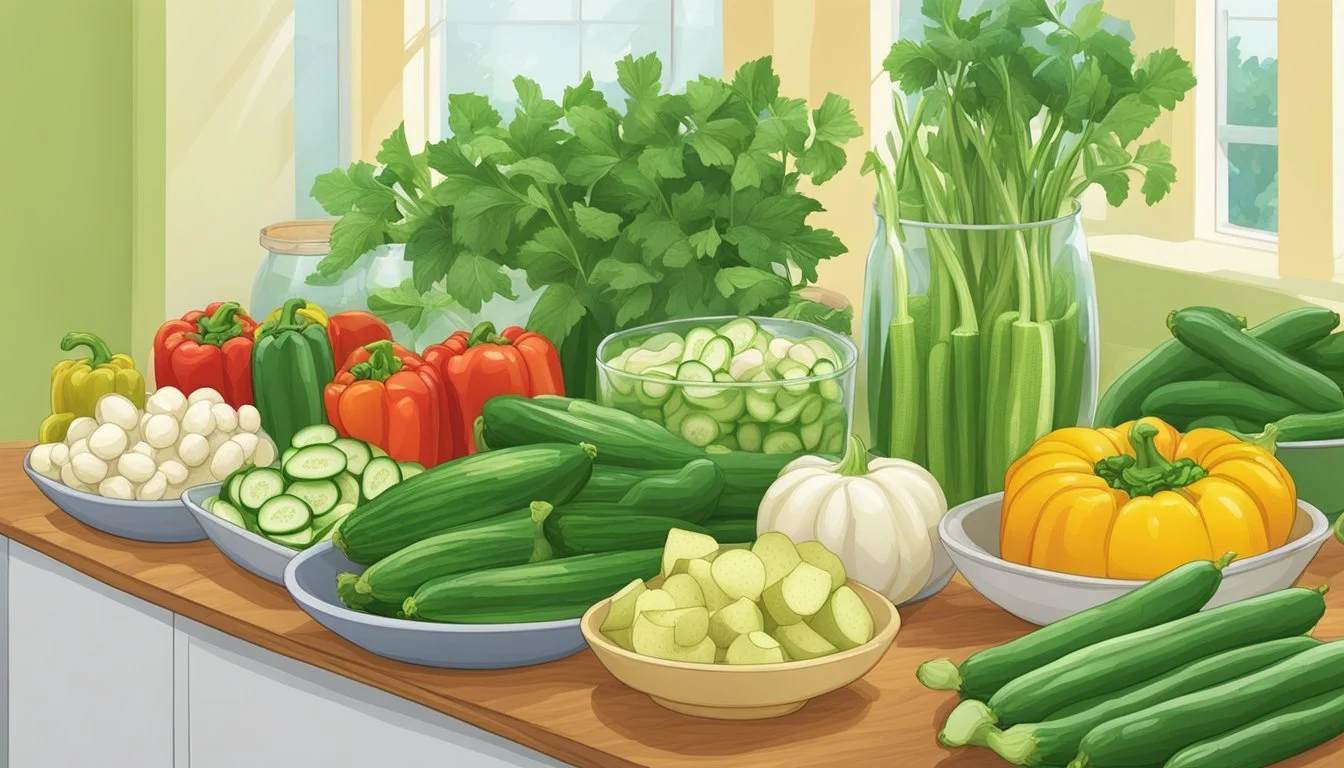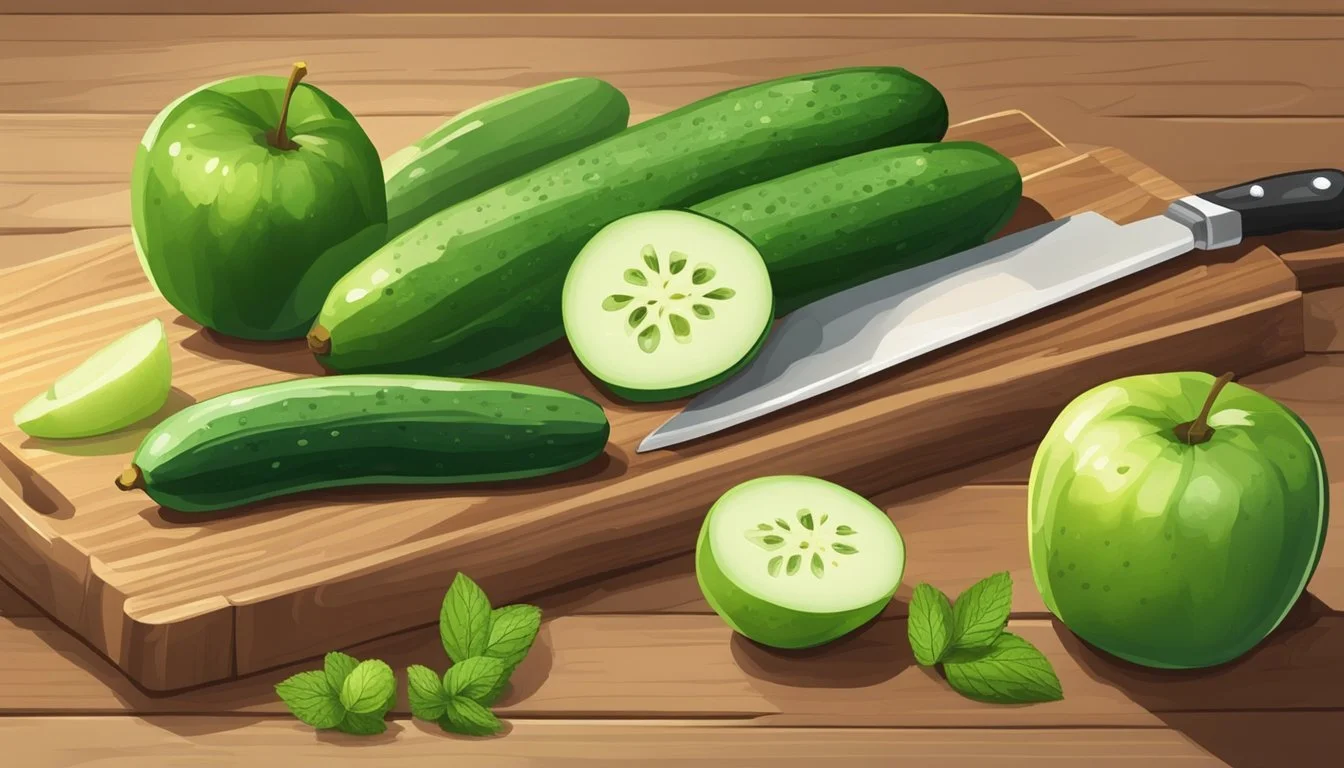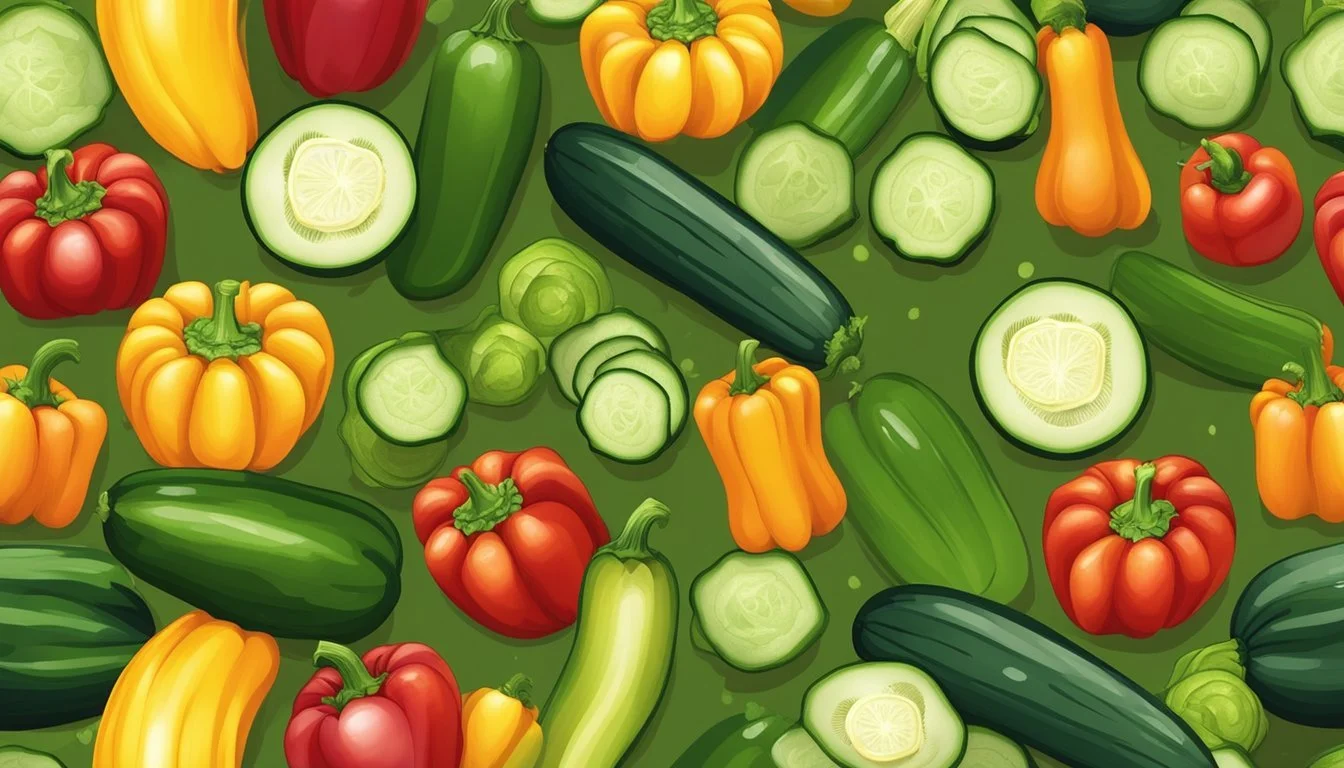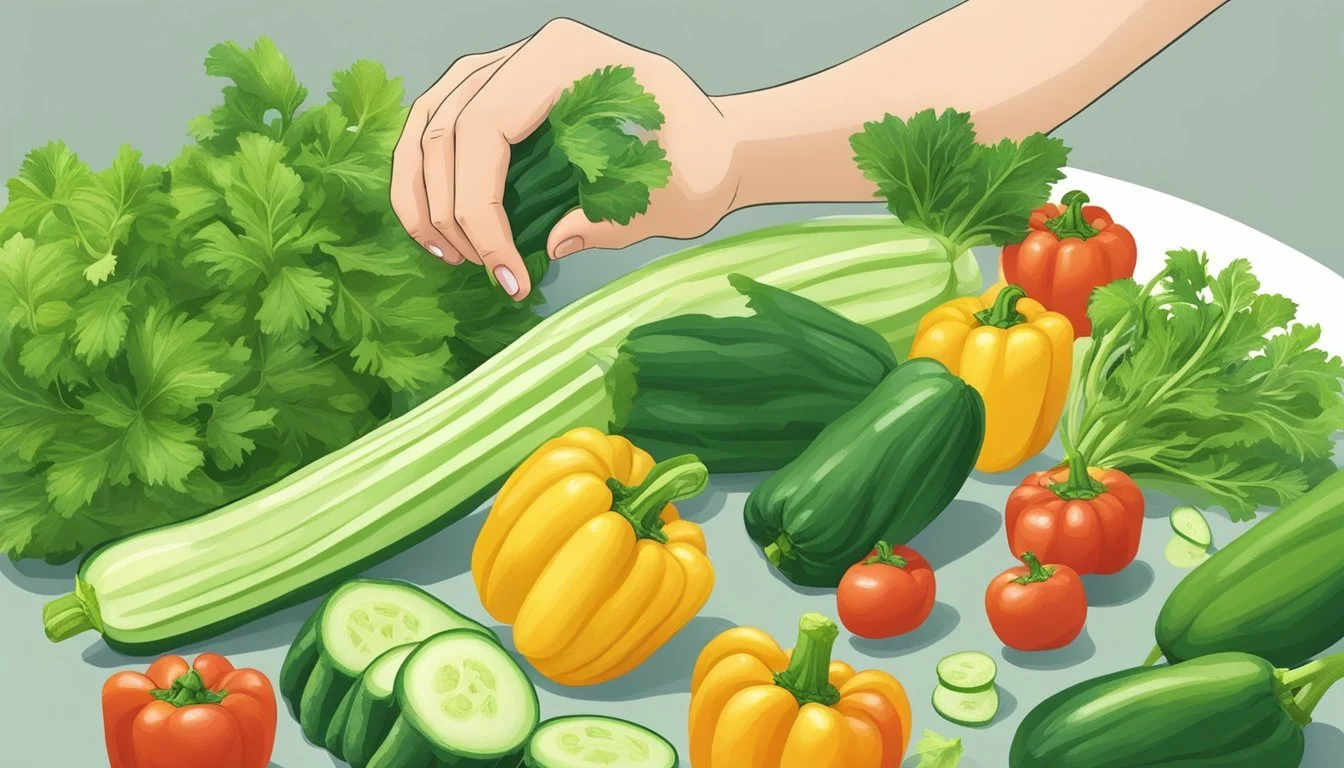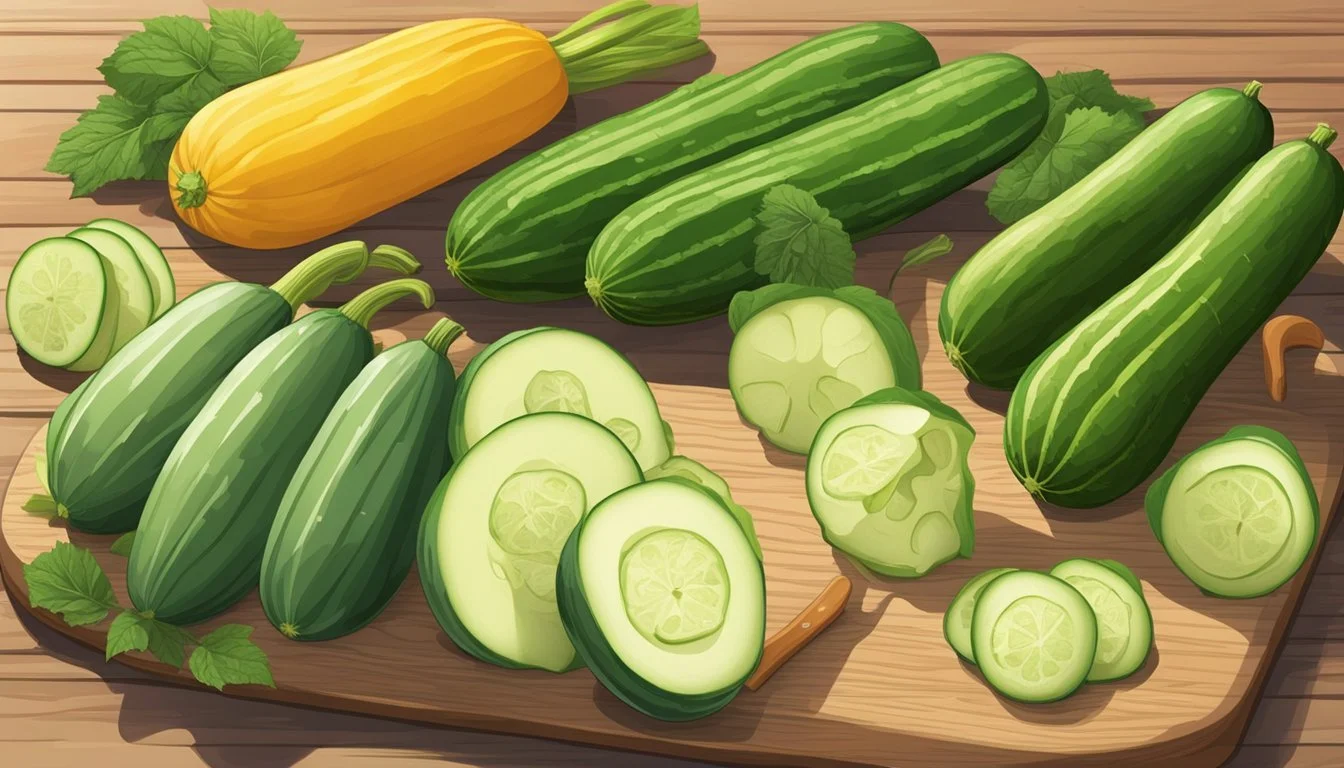Cucumber Substitutes
Best Alternatives for Your Recipes
Finding a substitute for cucumber can be essential for those who might want to diversify their recipes or accommodate dietary restrictions. Whether you're looking for something with a similar crunch or a different taste profile, understanding the best alternatives is key to maintaining the fresh, refreshing elements in your dishes. From celery's distinctive crispness to the subtle taste of zucchini, several options can seamlessly replace cucumber in salads, sandwiches, and more.
One popular choice is zucchini, which mimics the texture of cucumber well, especially when used raw. It's versatile and can be great in both fresh salads and cooked dishes. Similarly, the peppery crunch of radishes offers a distinct twist, enhancing the flavor profile of your meals without compromising on texture.
If you're seeking something unique, Persian cucumbers are also excellent substitutes due to their similar taste and texture. In addition, Armenian cucumbers, although technically melons, can fool anyone with their cucumber-like appearance and can be used in a variety of recipes. Choosing the right substitute depends on the specific qualities you seek, whether it's the fresh bite, the crisp texture, or the mild flavor.
Why Substitute Cucumbers?
There are several reasons why individuals might look for alternatives to cucumbers. Key considerations include allergies and dietary restrictions, seasonal availability, and personal preferences in flavor and texture.
Allergy and Dietary Restrictions
Some people are allergic to cucumbers, experiencing symptoms like itching, swelling, or digestive issues. In such cases, finding a substitute is essential to maintain enjoyment in dishes without risking health. Celery and jicama are excellent replacements, offering the refreshing crunch similar to cucumbers.
For those following specific diets, such as low-carb or paleo, cucumbers may not always fit their needs. Alternatives like zucchini offer the desired texture and mild flavor while adhering to dietary restrictions.
Seasonal Availability
Cucumbers may not always be available year-round, especially in regions with distinct seasons. During off-peak times, stores may have limited or expensive stock.
Seasonal substitutes like zucchini, iceberg lettuce, and green beans can be found more readily, providing similar textures and flavors. Relying on these substitutes helps ensure that recipes remain consistent and enjoyable regardless of the season.
Flavor and Texture Preferences
Not everyone enjoys the mild flavor and crisp texture of cucumbers. Some individuals prefer ingredients with different taste profiles or textures.
Zucchini, with its similar look and mild flavor, makes an apt substitute in salads or stir-fries. Bell peppers and radishes offer vibrant colors and a slightly different crunch, enhancing visual appeal and taste variety in dishes. Fennel and borage leaves also provide unique alternatives for those seeking different flavor elements while maintaining the freshness commonly associated with cucumbers.
Cucumber Substitutes in Salads
When cucumbers are unavailable or you want to add variety to your salads, there are numerous alternatives that mimic their crunch, freshness, and overall appeal.
Leafy Greens as Alternatives
Lettuce, particularly iceberg lettuce, can mimic the refreshing crunch of cucumbers. The crisp texture of iceberg lettuce is particularly similar, making it an excellent substitute. Spinach is another worthy alternative. While it doesn't offer the same crunch, its fresh, leafy texture complements various salad ingredients nicely. Incorporating these greens keeps the salad fresh and nutritious, providing a necessary volume and a mild base that lets other flavors shine.
Crunchy Vegetable Options
Celery and radishes are standout choices for replicating the crunch factor. Celery, with its crisp texture and mild flavor, easily fits into most salads. Radishes offer a unique peppery taste alongside a similar crunch, giving your salad an exciting zing. Green bell peppers also work well, adding a sweet, crisp bite that pairs seamlessly with most salad dressings. For a sweeter crunch, thinly sliced carrots can be a great addition to the mix.
Fruit-Based Substitutes
For those looking for something different, apples and green papaya can serve as innovative cucumber substitutes. Apples add a sweet, refreshing crunch, especially when thinly sliced or julienned. Green papaya, often used in Southeast Asian cuisine, provides a neutral yet crisp texture that absorbs the flavors of dressings and other ingredients well. Adding these fruit-based substitutes can transform a simple salad into a delightful culinary adventure.
Alternatives for Cucumber in Cooking
Cucumber substitutes can be essential in various cooked dishes and soups. While retaining similar fresh textures, these substitutes bring unique flavors and nutritional benefits.
Cooked Dishes and Stir-Fries
In cooked dishes and stir-fries, zucchini serves as an excellent alternative. It offers a similar crunchy texture when lightly cooked and absorbs flavors well. Zucchini can be sliced or cubed to match the size and shape of cucumber pieces.
Summer squash is another versatile option. It pairs well with a variety of ingredients and can be stir-fried or even grilled. Its tenderness allows it to cook quickly, making it suitable for quick stir-fry recipes.
Green beans can also substitute cucumbers in cooked dishes. They have a firm texture and low-calorie content. Green beans add a slight sweetness and crisp bite to the dish, whether steamed or stir-fried.
Soups and Stews
Radish, particularly the Daikon variety, is an ideal cucumber substitute in soups and stews. It provides a crunchy texture when added raw and tenderizes nicely when cooked. The peppery taste enhances the depth of flavors in soups.
Celery offers a crunchy and refreshing bite for soups and stews. It holds up well during cooking, maintaining its texture while absorbing the flavors of the broth or stew.
Jicama can be used as a substitute in chilled soups or added to warm stews for a crisp bite. It remains crunchy and fresh, enhancing the texture without altering the overall flavor profile.
Cucumber Alternatives for Snacks and Appetizers
For those looking to replace cucumbers in snacks and appetizers, there are a variety of options that offer similar crunch and refreshment. Various vegetables and fruits can step in effectively, each adding a unique twist to your snack platter.
Dippable Vegetables
Bell Peppers provide a crunchy, colorful option that pairs well with any dip. They come in different colors like red, yellow, and green, adding both visual appeal and varying flavors from sweet to slightly bitter.
Carrots are another fantastic substitute. They have a firm texture and bring a natural sweetness. Carrot sticks are an affordable and nutritious replacement, loaded with vitamins and minerals.
Jicama is a root vegetable known for its crisp texture and refreshing taste. It maintains its crunch when cut into sticks, making it ideal for dipping in hummus or yogurt-based sauces. Jicama also adds a slightly sweet and nutty flavor.
Persian Cucumbers are similar to regular cucumbers but are smaller and have a more delicate skin. They provide the same refreshing taste and crunch, making them an excellent alternative.
Creative Fruit Options
Apple slices can be used for a sweet and crunchy snack. They pair surprisingly well with savory dips like almond butter or cheese spreads. Apples also offer a nutritional boost, being high in fiber and vitamins.
Watermelon chunks might seem unusual, but they offer a juicy and refreshing option for summer snacks. This fruit can be paired with salty cheese or drizzled with balsamic vinegar to enhance its flavor.
Pineapple slices are another creative option. Known for their tangy-sweet flavor and high water content, they bring a different taste profile and work well with spicy or savory dips.
Jicama sticks, apart from being great dippable vegetables, can also be enjoyed with fruit-based salsas or sprinkled with chili powder and lime for a zesty twist. Jicama’s versatile nature makes it a go-to option in multiple snack scenarios.
Specialty Substitutes for Unique Flavors
When looking to replace cucumbers in your recipes, specialty substitutes can provide a unique twist while maintaining the desired texture and freshness. Here we examine options with herbal and fragrant qualities and those with a more bitter and earthy taste.
Herbal and Fragrant Alternatives
Borage Leaves offer a crisp texture similar to cucumbers, coupled with a mild, cucumber-like taste. These leaves introduce an added herbal note that can elevate salads and garnishes.
Fennel is another choice, with its slight anise flavor adding complexity to dishes. Its fresh, crunchy texture makes it a versatile substitute, especially in salads and raw preparations.
Green Apple slices can introduce a fresh, tart note that pairs well with savory and sweet dishes. Their crisp texture complements salads and cold dishes.
Bitter and Earthy Choices
Green Bell Peppers, known for their slightly sour and earthy flavors, can replace cucumbers effectively. Their crunchy texture and versatility allow them to be used in both cooked and raw forms.
Radishes offer a peppery kick and crunchy texture, making them suitable for salads and other raw dishes. Their unique taste can enhance a dish’s flavor profile significantly.
Celery brings a slightly bitter and earthy taste with a satisfying crunch. It's a great option for sandwiches and crudité platters, where texture plays a crucial role.
These substitutes not only mimic the texture of cucumbers but also introduce new flavors that can enhance your culinary creations.
Nutritional and Health Considerations
When looking for substitutes for cucumbers, nutritional value plays a crucial role. Many alternatives offer a variety of vitamins, minerals, and other beneficial nutrients.
Cucumbers are low in calories and contain a decent amount of vitamins like Vitamin K and Vitamin C. They are also rich in antioxidants and have high water content, making them hydrating and good for overall health.
Substitutes such as celery and zucchini also bring valuable nutrients to the table. Celery is low in calories but contains high amounts of dietary fiber. It is rich in Vitamin K, Vitamin A, and folate. Additionally, zucchini offers a good source of Vitamin A, Vitamin C, and manganese.
Nutritional Comparison
Food Calories Vitamin K Vitamin C Dietary Fiber Cucumber (100g) 16 16.4 µg 2.8 mg 0.5 g Celery (100g) 16 29.3 µg 3.1 mg 1.6 g Zucchini (100g) 17 4.3 µg 17.9 mg 1.1 g
In terms of dietary fiber, carrots can also be an excellent substitute. Carrots not only provide fiber but are also rich in beta-carotene, which the body converts into Vitamin A.
Other Considerations
Some substitutes like borage leaves and fennel offer unique benefits. Borage leaves are recognized for their anti-inflammatory properties while fennel provides essential minerals like calcium and potassium.
While cucumbers have their unique benefits, cucumber essential oil, known for its soothing and hydrating properties, might not have a direct substitute. Therefore, when focusing on nutrition, variety often helps in meeting dietary needs through other vegetables and fruits.
Selecting the Best Cucumber Substitutes
When deciding on a cucumber substitute, it's crucial to consider factors such as appearance, flavor compatibility, and texture.
Appearance and Presentation
The visual appeal of a dish plays a significant role in enjoying the meal. Substitutes like celery, zucchini, and iceberg lettuce are excellent for providing a refreshing green color.
Zucchini and Persian cucumbers closely resemble cucumbers in shape and color, making them ideal for maintaining aesthetic consistency.
For dishes requiring a more vibrant green, komatsuna and spinach are suitable choices, especially when serving raw or lightly cooked. Green beans can also be used to add a similar crunchy green element.
Flavor Compatibility
Flavor is key when replacing cucumbers, which have a mild, slightly sweet taste. Celery offers a mild and refreshing flavor, making it a top choice for many dishes.
Radishes introduce a peppery kick, ideal for salads where a bit of spice is welcome. Green peppers can replace cucumber in savory dishes due to their fresh and slightly sweet flavor.
For a fresh and tart alternative, green apples work well and can provide a surprising twist to certain dishes. Jicama offers a subtly sweet and starchy flavor, suitable for various culinary applications.
Texture Matching
Cucumbers are known for their crisp and juicy texture. In terms of crunch, celery and jicama are excellent substitutes. They maintain the crispiness needed in salads and vegetable platters.
Zucchini and iceberg lettuce offer a soft and tender texture, similar to cucumbers, which can be ideal for sandwiches and wraps. Borage leaves and green beans also contribute a nice crunch when used raw.
For those preferring a substantial bite, fennel provides a slightly anise-like crunch, which can be a unique addition to various dishes. Radishes deliver a firm yet crunchy texture, perfect for adding a peppery crispness.
By considering appearance, flavor, and texture, selecting the best cucumber substitute becomes easier and ensures the integrity and enjoyment of the dish.
Innovative Use of Cucumber Substitutes
Cucumber substitutes can enhance a variety of recipes, adding unique textures and flavors. These alternatives can transform traditional cucumber dishes and integrate seamlessly into modern culinary practices.
Reinventing Classic Cucumber Dishes
Substitutes like jicama and zucchini can refresh classic cucumber dishes, maintaining their appeal. Jicama, with its crisp texture, works well in salads and can be seasoned with lemon juice and chili powder for an added zest.
Zucchini is another great option, closely resembling cucumbers in both appearance and crunch. It can be used in cucumber-based salads or sliced thin for sandwiches. Pickling fans will appreciate how thinly sliced zucchini absorbs brine, making an excellent cucumber substitute for homemade pickles.
Using Persian cucumbers in place of standard varieties ensures the same fresh, crisp bite in recipes. They are especially effective in salads, where their smaller size offers a concentrated flavor.
Cucumber Substitutes in Modern Cuisine
In modern cuisine, cucumber substitutes bring versatility and innovation. Bell peppers add vibrant color and a sweet crunch to recipes, making them stand out in salads and fusion dishes. For those seeking crunch in their burgers or stir-fries, celery offers a robust texture.
Fennel provides a mild, anise-like flavor that pairs well with fish and seafood dishes, transforming traditional cucumber dishes into something refined. Green beans, with their firm bite, can replace cucumbers in cold salads or as part of a vegetable platter.
Even less common substitutes like borage leaves can be used creatively. These leaves have a slight cucumber flavor, making them suitable for garnishing dishes or enhancing cold soups. Exploring these alternatives allows for the creation of exciting, diverse recipes.
Preparing Substitutes for Optimal Results
To get the best experience from cucumber substitutes, focus on how you handle, store, and cut them. Proper preparation ensures maximal flavor, texture, and freshness.
Handling and Storage
For substitutes like zucchini, celery, or jicama, start by choosing fresh and firm specimens. Zucchini should have shiny, unblemished skin and feel heavy for its size. Celery ought to be crisp with no sign of wilting. Store these substitutes in the refrigerator.
Zucchini and jicama keep best when placed in a plastic bag with a paper towel to absorb excess moisture. Celery can be wrapped in aluminum foil to maintain its crunch for up to two weeks. It's important to wash and dry vegetables before storage to remove any dirt or bacteria.
Cutting Techniques
Appropriate slicing techniques enhance texture and flavor in recipes. For zucchini, jicama, and celery, ensure even cuts to maintain uniformity in cooking and presentation.
For salads, zucchini can be thinly sliced or julienned. Jicama provides a crisp bite and is best when cubed or thinly sliced. In dips, finely chop celery to release its refreshing flavor and maintain its crunch. Using a sharp knife or mandoline ensures a clean cut, avoiding mashed or uneven pieces which can affect texture and presentation.

